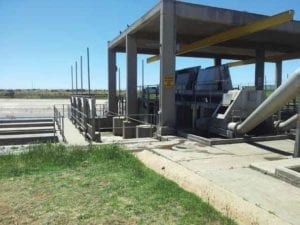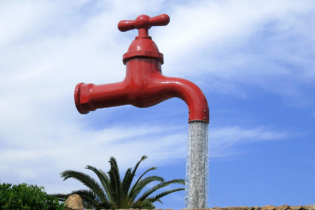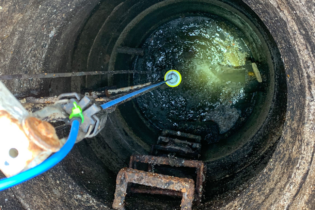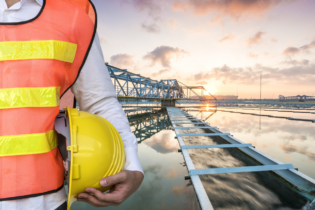Although the water industry is still a male dominated field, this dynamic is changing as more women, like Aurecon associate Teboho Mofokeng, prove their worth on larger scale projects.
Is it difficult? Yes, but isn’t anything worth doing difficult?” she answers when asked about the challenges inherent in being a woman in a ‘man’s world’. One of the challenges, according to Mofokeng, is that the technical capability of the female engineer is generally underestimated. “But at the end of the day, the moment people realise that you can contribute and add value to their project, it doesn’t really matter whether you are female or male – gender ceases to be of relevance.” She adds that being male or female doesn’t impact on getting the job done – specifically in the engineering sphere. “We deal with technical matters and providing innovative solutions. This is where your thinking capability as an individual comes into play and that has nothing to do with gender,” says Mofokeng. Mofokeng offers this advice to other women in her position: “You simply need to know and understand your craft. The quality of service you provide will speak for itself and more than that there will be no need to prove yourself. In my experience of dealing with our clients (most of whom are from the government sector), I’ve learned to be diplomatic and to listen attentively in order to provide solutions that are practical and also meet the client’s needs.” “I think, nowadays, businesses in general – including Aurecon – are more geared towards uplifting women.” She is quick to note, however, that this perspective is been largely based on her observation of the private business sector. “I don’t think it is as challenging for females now as it was a couple of decades ago. Conditions are definitely better as a result of employers making a real effort to ensure women are well-represented in the engineering sphere.” A changing dynamic globallyMofokeng adds that it is crucial that every individual within the industry keeps abreast of the most recent research studies and technologies. “Thanks to technology and enhanced communication tools, the world is literally seamless and it is no longer about being on separate continents or separated by distance – people are looking to partner and leverage off each other’s experience and expertise. As evidence of this growing phenomenon, she highlights initiatives by government to twin with water boards from other cities. “This is a very positive direction to be moving in as there can be a sharing of information and expertise from others that have travelled further down the road. This helps to improve our skills base in South Africa and in time we can help improve the skills base at other water boards.” Local progress
When it comes to ascertaining whether our local water industry is progressing on the whole, Mofokeng’s answer is encouraging: “I think there are various entities and associations which are supporting the drive to help government maintain infrastructure and upskill people operating the water and wastewater treatment plants.” She adds that engineers have a responsibility to provide sustainable solutions. However, proper operation and maintenance of treatment plants is essential to ensure that the infrastructure serves its design lifespan.“
Nevertheless, she admits that there are challenges facing all parties involved – not least of which is the succession issue. “Many experienced personnel managing and operating the South African plants have retired or are close to retirement and there needs to be succession plans in place.” It is crucial to ensure that treatment plants, small or big, are operated by personnel that have an understanding of the treatment processes used and fully appreciate the consequences of not meeting the statutory effluent requirements.
“Various water institutions and role players in the water and sanitation industry are working on ways to address the challenges that the industry currently faces. I am hopeful that we will reap the benefits in the coming years and will progress from the current status quo,” states Mofokeng. Education is essentialMofokeng is a strong proponent of not only education – but the strategic upskilling of key personnel. “Eventually, I would like to be involved in upskilling plant operators. I am passionate about teaching and passing on my knowledge.” Operator knowledge in some cases is limited to switching buttons on and off. This limits the capacity to ensure that plants are operated optimally. She cautions that knowledge-sharing needs to be strategic and purposeful. “It is essential that operators have an understanding of the treatment process as this will enable them to react with competence when trouble shooting. I believe that everyone involved from operations, to maintenance and asset management has a vital role to play in the supply of safe drinking water. All should be sensitised to the effect their role has on society.” According to Mofokeng, despite an emphasis on further education in the industry, more can be done to sensitise school children on the real cost of water and sanitation. “While water and sanitation is a basic right it does come at cost, which includes capital, operation and maintenance. We can all contribute to help decrease the cost where possible.” Mofokeng believes that this type of education will instil a greater respect for the end product and processes involved, and as a result, people will hopefully do better because they know better. Aurecon influential in growth
Mofokeng’s role at Aurecon and the opportunities the group has afforded her have played a huge part in her growth, both individually and as a water engineer. “I believe we have som e of the most experienced water engineers on our team in South Africa. I have learnt so much from them,” says Mofokeng. She adds that Aurecon has allowed her to grow her leadership abilities by assisting her to become wellversed in how to deal with valued clients. “The company has in place wonderful programmes that help individuals to skill themselves on the softer issues of engineering, because we all deal with people at the end of the day,” she states. In conclusion, Mofokeng believes that business is about building relationships based and trust and integrity while providing excellent service. The growth of the global population and the consequent strain it places on water resources and sanitation infrastructure means that there is a need for innovative thinkers to provide future solutions and engineering services. “I believe that women can equally contribute to this need.”







